Clark County teachers revamp quiz-bowl format to compete nationally
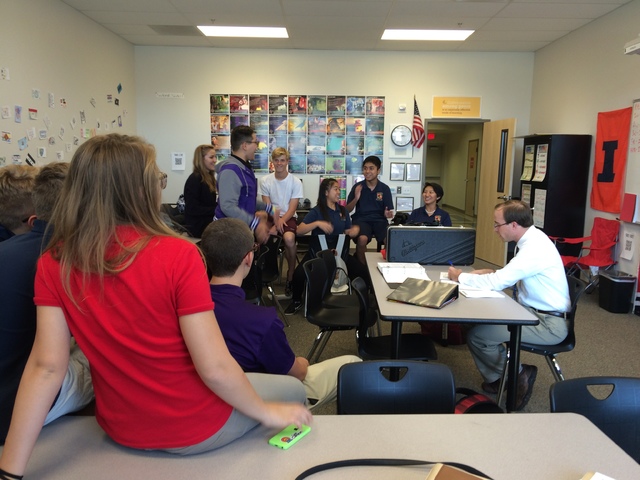
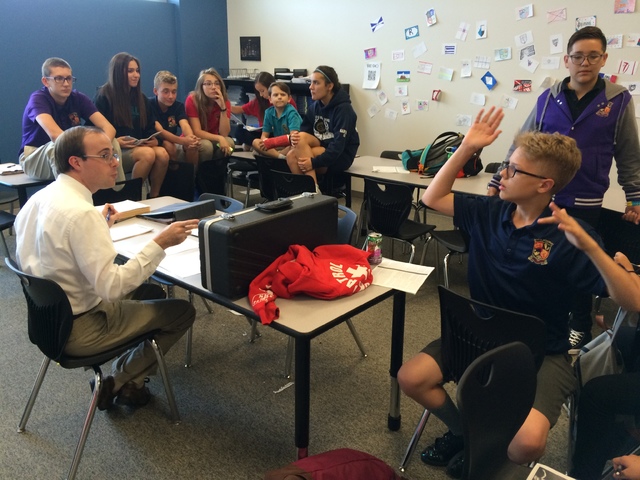
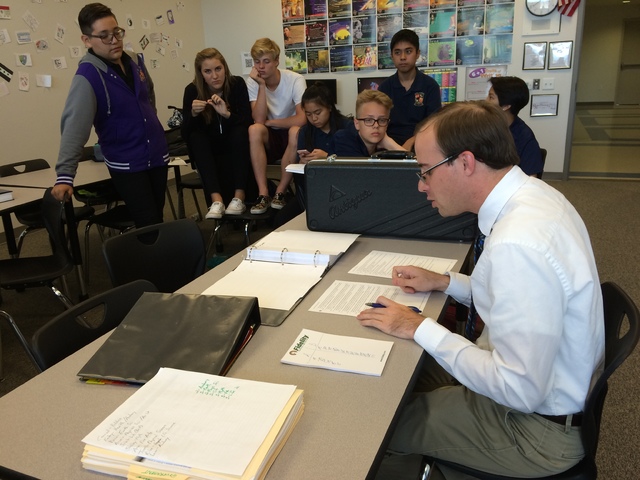
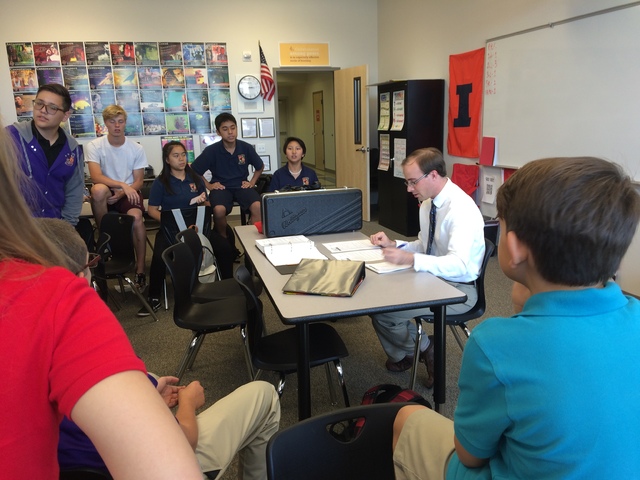
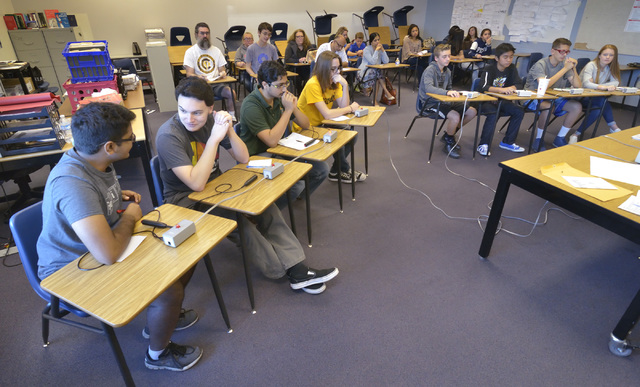

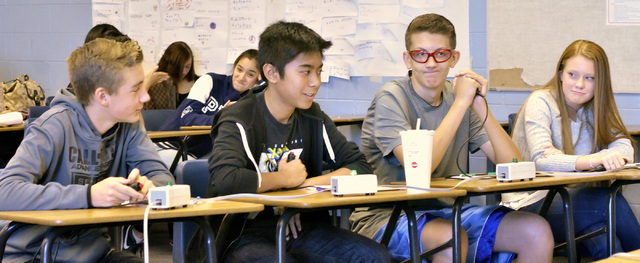
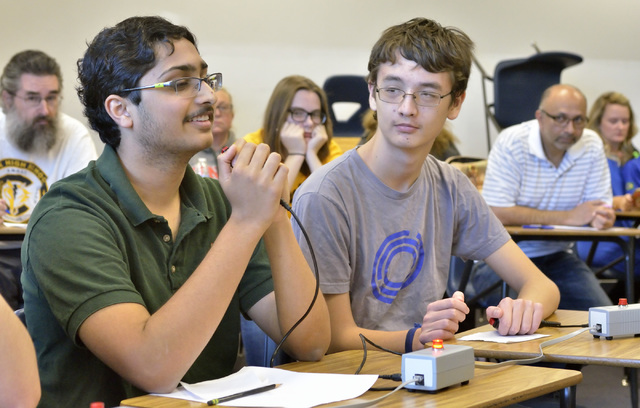
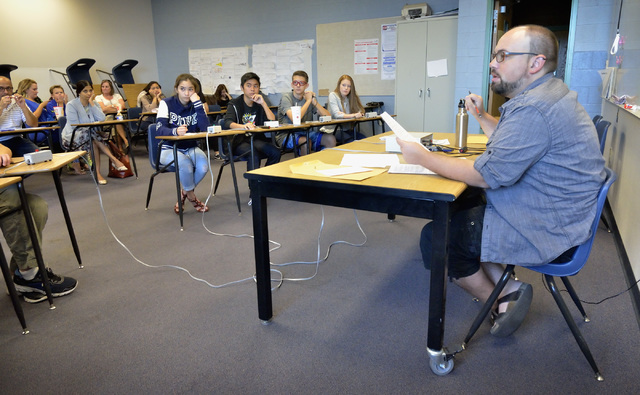
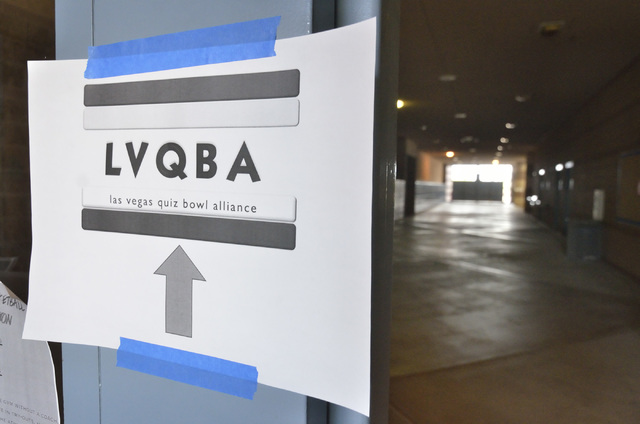
Like game shows get updated to have more of a “wow” factor, quiz bowls at some area high schools are getting a makeover to follow the National Academic Quiz Tournaments (NAQT) format, which has two types of questions: toss-ups and bonuses.
At Doral Academy, the update is seen in Matt Albert’s extracurricular group, the Red Rock Quiz Bowl team, consisting of about a dozen students. Almost all are freshmen, with a couple of middle school students added in.
Albert, the English-language arts teacher at Doral, was involved in quiz bowls when he was a student in New Lenox, Illinois.
“When I moved out here and started coaching, I quickly saw that the format was reminiscent of the 1990s kind and it doesn’t look much like the national format now,” he said. “When I taught at Western (High School) the last few years, it dawned on me that I can get my kids to play the Clark County (School District) format pretty decently in a couple of years, but it doesn’t prepare them for the biggest competitions in the country.”
The change was further prompted by Nevada’s performance on the national stage. At the May event, held in Dallas , Western made it through three rounds. The other teams had the advantage, Albert said, of having competed in the national format. Albert and like-minded colleagues at other area schools — Chuck Bean at Clark High School, Debra Hogue at Western, Kelley Smith of Somerset Losee and David Fisher Liberty High School in Henderson — are revamping their after-school groups to play in the faster, harder format, in which reading college texts is recommended. The format also allows students to buzz in on the more obscure information, before the dead-giveaway clues.
A visit to the Doral Academy, on the western edge of Summerlin, showed how the students are learning. They gathered in the English literature classroom and quickly divided into two groups. No buzzers were available yet at the newly opened school, so students had to say “ding” to be recognized.
“There’s no way to cheat,” Albert said. “Let’s see how you do. This forest in Germany is the source of the Danube River.”
No one “dinged” in.
“Answer: Danube. Next question: The Sequoia National Forest lies near the city of Bakersfield in this U.S. state,” Albert said.
“California,” a student called out.
Correct answers elicited high-fives, fist pumps and squeals of delight.
Albert continued, “This iconic photo by Joe Rosenthal showed Marines raising the flag atop Mount Suribachi at … ?”
“China.”
“No. Iwo Jima,” Albert said. “For 10 points, name these migrant workers of the Great Depression who carried bindles.”
“Factory workers?”
“No, good guess, though.”
“Immigration?”
“Paperboys?”
“No. Hobos.”
The rapid-fire questions continued and covered myriad topics — art, geography, astronomy, mythology, history. Pop culture and movie trivia were thrown into the mix. After a while, everyone took a break.
“The toughest part is that a lot of the questions I don’t know,” said Katey Barrera, 14. “Like, I’m not really good at English literature. It shows me that there are things I need to work on to get better.”
Conrad Brunkhorst, 14, said he planned to prepare by going through the study packet every night.
“I like being the kid who knows all the random facts,” he said, adding that he watches the TV show “Jeopardy!” religiously. “I’ve dreamed of being on there and knowing everything and winning it.”
Asher Patton, 11, is one of the team’s few middle school students. He said he likes history, particularly facts about Alexander Hamilton and President Franklin Pierce.
Anna Sanchez, 14, who is considering being a writer, said this was one competition in which girls and boys could compete without physical strength being an issue.
“It’s fair; everybody has an equal chance,” she said.
The questions began again. At one point, Albert mentioned the periodic table and the students launched into a song they’d learned to remember all the elements on it.
The students received their study guides to take home. Albert cautioned them to study what they didn’t know, as they would likely not forget something already imprinted in their brains.
“If you know the basics, cross that out. What you don’t know, turn it into flash cards,” he told them.
Albert said CCSD has expressed support for schools using a more difficult format, although it was sticking with its own format.
“The CCSD format works well for its PBS TV show. So I can understand why they would not want to change. … We’re not competing with CCSD,” he said. “They actually want students to compete in both.”
To reach Summerlin Area View reporter Jan Hogan, email jhogan@viewnews.com or call 702-387-2949.












